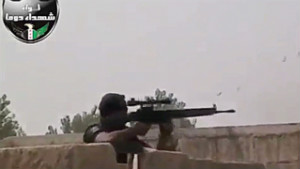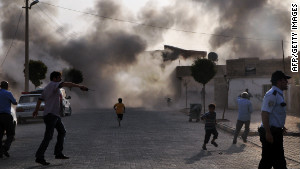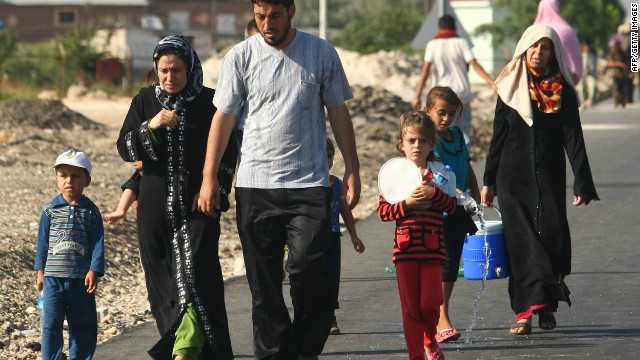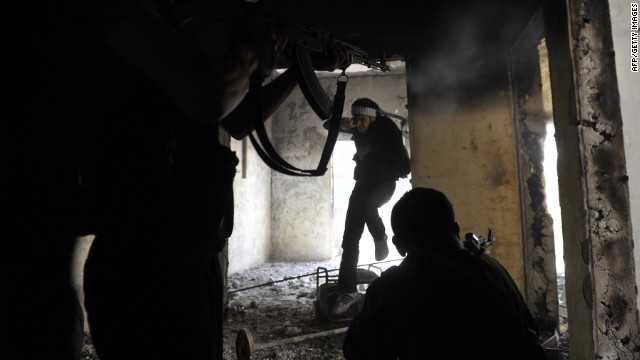From Gul Tuysuz, CNN
October 8, 2012 — Updated 0033 GMT (0833 HKT)
Syrian rebels take up positions inside a building during clashes with government forces in Aleppo on Saturday, October 6. See more of CNN’s best photography.
- NEW: Syria’s defense minister says forces are more resolved than ever to restore peace
- NEW: At least 110 are dead from fighting inside Syria, says an opposition group
- NEW: U.S. defense secretary expresses concern that the conflict could broaden
- A third shell falls in Turkish territory, a semi-official news service says
(CNN) — Residents of a Turkish border town hid inside their homes Saturday after three Syrian shells landed inside Turkey in separate incidents amid fierce fighting in Syria.
The shelling prompted Turkish forces to return fire as clashes between the two neighbors entered a fourth day, according to government and semi-official media reports.
As Turkish forces deployed along the border, Foreign Minister Ahmet Davutoglu warned that “any future attack on Turkey from anywhere will be silenced,” according to the semi-official Anadolu Agency news service.
The Syrian shells hit outside two villages in Hatay province, the provincial government said in statements.
Where the border clashes took place
One shell landed about 50 meters (164 feet) into Turkey. In the second incident, a shell landed about 1.2 kilometers (0.75 miles) into Turkey, between a Turkish village and a border post, the provincial government said.
 Rebels attack army barracks in Damascus
Rebels attack army barracks in Damascus
 Turkey-Syria ties strained by violence
Turkey-Syria ties strained by violence
Turkish shells rain on Syria
In both cases, authorities believe Syrian troops were firing on rebel forces stationed near the border.
The Anadolu Agency news service said three shells had been fired Saturday into Turkish territory.
Turkish border troops retaliated, firing twice into Syrian territory, the Hatay government said.
Who is arming the Syrian conflict?
U.S. Defense Secretary Leon Panetta expressed concern about the cross-border activity.
“The fact is, there is a war going on in Syria between the opposition and the regime forces, and it’s one that has cost a large number of lives,” he told reporters in Lima, Peru. “Whether or not that conflict begins to extend into the neighboring countries such as Turkey remains to be seen, but obviously the fact that there are now exchanges of fire between these two countries raises additional concerns that this conflict could broaden.”
The shelling comes amid fighting between rebel and regime forces over the nearby Syrian border village of Khirbet al-Jouz. Rebel forces captured the village Saturday after seven hours of fighting, according to the London-based Syrian Observatory for Human Rights.
At least 40 Syrian soldiers and nine rebels were killed in clashes in Khirbet al-Jouz and in the Jisr al-Shughur countryside, in Idlib province, the group said.
Residents across the border in Turkey could see and hear gunfire from the fighting, and government officials took to village loudspeakers to warn residents not to go outside.
“How can we not be afraid? Listen you can hear the gun-fighting,” said resident Hamza Tuncer.
Tuncer said he helped carry the bodies of two dead fighters into the village.
One was a fighter who suffered a foot wound but decided to return to the battle, Tuncer said.
“That’s when he got shot in the head,” he said.
In addition to the shelling, fires from forests burned in the conflict have spread to the Turkish side of the border, leaving the air filled with smoke, resident Turhan Tomak said.
“We have no forest left. It hurts my insides. All our forests are gone,” Tomak said.
The back-and-forth shelling between Syrian and Turkish forces began Wednesday when a shell fired from Syria hit the Turkish town of Akcakale, killing five civilians and injuring nine others.
Children in a war-torn Syria town hold school in a cave
Davutoglu said he was certain the shells that hit Turkey on Saturday came from the Syrian army because it is a type used only by that country’s forces.
His warning against Syria comes amid a buildup of forces along the Syrian border. Armored units have deployed to several areas along the border, the Anadolu Agency reported.
The Turkish parliament has approved a resolution allowing military forces to deploy abroad, but government officials have said they do not want war with Syria, once a close ally.
But Turkish Prime Minister Recep Tayyip Erdogan has warned Syria not to escalate tensions.
U.N. still has no plan for Syria
“It would be a deadly mistake to test Turkey’s deterrence, determination and capacity,” he said.
The U.N. Security Council condemned the shelling and appealed for restraint from both countries.
Before Saturday’s incidents, Syria’s U.N. Ambassador, Bashar Ja’afari, said his country “is not seeking any escalation with any of its neighbors, including Turkey.”
Rebels report a potentially key ‘capture’
In addition to the fighting over Khirbet al-Jouz, government and rebel forces clashed near Damascus, Aleppo and other cities. Heavy fighting was reported in the western province of Homs, where fighting and shelling left 24 people dead, according to activists.
Nationwide, at least 110 people died in fighting Saturday, the opposition Local Coordinating Committees said.
Meanwhile, the al-Farouq brigade, one of the rebel groups operating in Homs, claimed on its Facebook page to have captured 1st Lt. Housam Assad and two of his aides. The military commander of that brigade, Abu Sayeh Jenaidi, appeared on Al Jazeera and said the detainee claims to be a direct relative of Syrian President Bashar al-Assad. Housam Assad is wounded, but in stable condition, the military commander said.
CNN cannot independently verify the claims by al-Farouq brigade, nor the relationship that Housam Assad may have with the Syrian president.
Syrian defense ministers says security forces are more determined than ever to restore peace
Defense Minister Gen. Fahd Jassem al-Freij spoke Saturday on state TV, the state-run Syrian Arab News Agency (SANA) said.
“Our armed forces today are more resolved to restore security and stability to Syria and cut off the hand of whoever tries to harm it and eliminate the remnants of defeated terrorists wherever they are,” SANA reported he said.
Al-Freij was named minister after his predecessor was killed in July.
He noted, also, that “the homeland’s door is still open to all its sons, including those who were misled and want to go back on track under the homeland’s umbrella,” SANA reported.
Saturday marks deadline for Iranian hostages
Iranian officials urged international groups to act to stop the threatened killing of 48 Iranian citizens by Syrian rebels, according to the semi-official Fars News Agency.
In a video posted to YouTube, the rebels holding the hostages have threatened to begin killing them Saturday unless the Syrian regime releases rebel detainees and stops what the rebels called the “ongoing random slaughter” of innocent civilians.
The group, the Revolutionary Council of Eastern Ghouta, said one hostage would die for each Syrian killed by government forces.
The hostages were kidnapped in August while on what Iran has described as a religious pilgrimage. The rebels have described the hostages as members of Iran’s military, an assertion Iran has denied.
Iranian Foreign Minister Ali Akbar Salehi talked with Davutoglu by telephone Saturday and urged him to help secure release of the hostages.
The semi-official Mehr News Agency said Salehi also spoke with the prime minister of Qatar in an effort to resolve the situation.
Sources: Pro al Qaeda group steps up suicide bombings in Syria





 Rebels attack army barracks in Damascus
Rebels attack army barracks in Damascus Turkey-Syria ties strained by violence
Turkey-Syria ties strained by violence